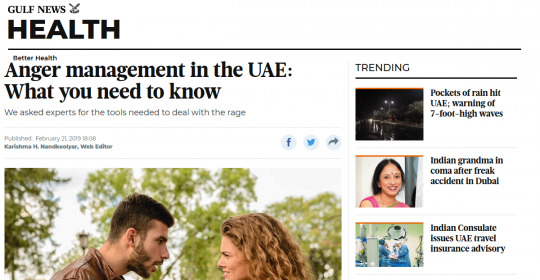
Gulf News: Anger management in the UAE: What you need to know
Yelling on the road, driving like a maniac, throwing things during an argument. Blurting out unpleasant thoughts without a filter. It’s like a nail scratching the length of your food pipe or a hammer chipping away at the side of your brain. Rage, at its most basic, is a lash of emotion that can stun you – and those around you – with an intensity not unlike fire. And like flames, it can hurt your relationships and your peace of mind. Anger, a human feeling that helps you understand your own displeasure at something, is normal – but if you find yourself suffering frequent bouts of upset and agitation, you may have an issue that needs management.
We asked the experts in UAE what makes people so angry, and what can one do when faced with the negative emotion.
What is anger?
Dr Fabian Saarloos, Clinical and Health Psychologist at German Neuroscience Center, says that anger is an instinctive emotion. “Emotion,” he explains, “[comes from the Latin [word] referring to a drive regulated by the brain that sets the body in to motion to perform a certain response that ensues survival. Evolutionary, anger arises in situations in which our boundaries are transgressed, and the brain is preparing the body to become active in protecting/defending or reasserting the boundaries.”
Are some people just born angry?
“Since the brain’s development is coded by our genes, yes, one’s genetics can predispose one to be more prone (neurologically) to emotions in general,” says Dr Saarloos.
“However, since the expression of certain genes over others is determined by environmental factors, and the development of the brain heavily depends on the primary caregiver’s (mother/father) interaction with the child, the regulation of emotions develops more as a function of safe/secure attachment and parenting,” he adds.
What about expressing that rage?
The expression of anger, however, is a different story: you can teach someone to calmly address a situation or be a volatile reaction to the issue.
“Our behaviour constitutes a learnt response,” says Dr Saarloos.
In the beginning, [we have] undifferentiated and primitive (crying/shouting, showing teeth, physical activity and fighting), the older and more socialised the individual becomes (in which cognitive and linguistic development are very important), the individual will learn more socioculturally acceptable forms of expressing anger, such as sarcasm, or venting the tension in other expressive ways (e.g. sports, arts, creativity, etc), or [dealing with it through] diplomacy and making concessions. […]
The full original article was published in Gulf News

